By Sasha Stogniy
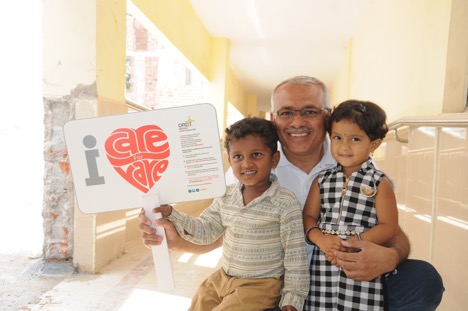
The Organization for Rare Diseases India (ORDI), co-founded by Prasanna Shirol in 2013, is a national umbrella organization which represents millions of men, women and children that are affected with rare diseases in India. It is a section 25 non-profit company in India. ORDI’s overarching goal is to raise awareness for rare disorders, which in turn will emphasize the need to articulate early diagnosis, treatment, support and better national policy encompassing rare disorders.
Support for Rare Diseases in India
Prasanna’s long journey started with his daughter, who was one of the first patients of a rare genetic disease called Pompe. It took approximately seven years to diagnose her condition in India – a challenge exacerbated by the lack of health insurance, absence of government policy for rare diseases, and a shallow awareness within the medical community. Prasanna was able to get the necessary medicine at no cost (International Charitable Access Program) from a company in the United States with the help of the International Pompe Association, a parent support group for Pompe patients. Being able to reap the benefits of a parent support group and save his daughter’s life, Prasanna realized the greater potential of such an organization.
There were no parent support groups for rare diseases in India. Support groups existed for diseases like Hemophilia and related illnesses, but their activity was limited at the state and city level. Initially Prasanna started the Pompe Foundation to support his daughter’s condition; however, as she was the only patient at that point, he could only do so much. Prasanna then founded the Lysosomal Storage Disorders Support Society (LSDSS), the first national parent support group for 45 rare diseases, along with other parents. They raised awareness for rare diseases and focused on reimbursement of treatment for children in India. Despite addressing the issue to almost 12 state governments, there was hardly any outcome. After four years, Prasanna’s decided to dedicate all of his time and energy to the cause.
Unlike other countries, India did not have a national umbrella organization for rare diseases India. Upon realizing the necessity, in 2013, along with other co-founders, Prasanna started ORDI to spread awareness of rare diseases among the general public and the medical community to sensitize the media and government policymakers to the issue. ORDI’s mission was to get a national rare diseases policy for the country.
ORDI’s Approach
Supporting patients: By establishing a Care Coordination Centre, ORDI has been able to provide support to patients, as well as their caregivers, in a unique way. They also work with healthcare providers and hospitals to help them better provide care to rare disease patients. Additionally, ORDI has established a national hotline in order to assist patients across the country.
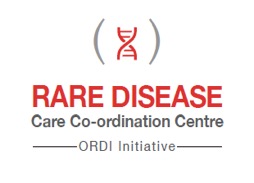
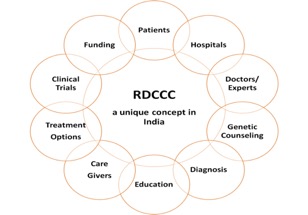
Rapid diagnosis: This key strategy has been connecting existent but under-resourced support groups for patients with rare diseases thus leveraging these connections to create crucial social and policy changes. Through public and private partnerships, ORDI has also advocated for mandatory newborn screenings in order to improve the diagnosis process.
Public Policy development/implementation: to cover rare, undiagnosed and genetic diseases patients in India. By filing many Public Interest Litigations (PIL) to represent the collective voice of those affected by rare diseases, ORDI was able to gain support from the Karnataka state government in treatment. ORDI is still striving to achieve this on a national level.
Building a Network of Organizations: connecting patients with any of 7000+ diseases in India in collaboration with international consortia such as the National Organization for Rare Diseases, EURORDIS, RDI International Rare Diseases Consortium, Undiagnosed Diseases Network, International Conference on Rare Diseases & Orphan Drugs, Rare Genomics Institute, and many others. ORDI also works to host national and global events to bring all stakeholders of rare diseases together for debate and discussion. Past events featured by the ORDI include the Conference for Rare and Undiagnosed Diseases in New Delhi.
Facilitating and encouraging research : While researchers are working to treat many of these diseases, the medications often become Orphan drugs commercially underdeveloped drugs that may not be used by many patients. By advocating for more research in regards to rare diseases and finding economic solutions, these drugs can potentially improve quality of life for many patients.
Race for 7 : a large-scale nationwide Awareness Campaign organized by ORDI to mark World Rare Diseases Day. Racefor7 symbolizes going the distance for rare diseases by running for 7 kilometers. Since it was started in 2016 and the race has been highly successful. Over 3,500 people participated in the Bangaluru race in 2018. In the same year Racefor7 was conducted in Mumbai & Washington D.C., where over 1,500 & 100 supporters participated, respectively. In 2019 the campaign was hosted by 9 key cities. 2020 is the fifth year of the campaign and will be the biggest year yet, reaching out to as many as 23 target cities (shown below), making it the world’s largest multi-city event.
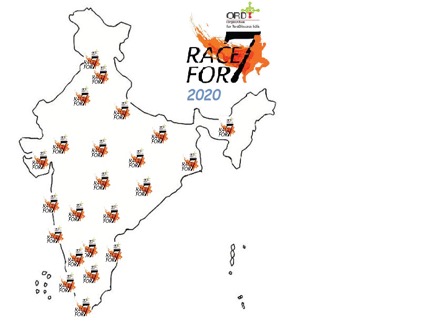
Challenges Faced
Overcoming Distance: With an area of 1.3 million square miles, India is a large country. Traveling from one part to another is always a challenge, as is trying to build an organization that creates an impact across all of India.
Parent Involvement: Trying to connect parents across India is a major challenge. They are already struggling with their own child, desperately searching for something to save their child’s life. That is their most important priority. Prasanna urges them to organize together to achieve long-term advocacy goals. However, many parents fail to see the value in dedicating time to something that will not directly help their child in the short-term.
Securing Funding: The knowledge of rare diseases in India, including the government and the social sector, is very sparse which in turn makes funding activities equally challenging. Prasanna has been focusing on finding ways to fund impactful awareness activities in India.
Best Practices
Early Diagnosis: Of the 7,000+ recognized rare diseases, 80% are genetic in nature. The first concern is that if they are not diagnosed early, others in the family are at risk for developing the same condition. The second important concern is that 50% of rare disease patients are children, and 30% don’t survive more than five years. The earlier the diagnosis and treatment are given, the greater the chance they survive and do well.
Awareness amongst the Medical Community: Rare disease diagnosis remains a challenge for patients, doctors, and healthcare systems. Factors contributing to the lack of awareness also include the social stigma involving disabled individuals as well as lack of availability of epidemiological data pertaining rare diseases.
Broader Systems of Support: In India, most government schemes and healthcare policies are directed towards families who are below the poverty line. Due to high costs of treatment and the absence of healthcare and insurance policies, ORDI wants to propose policies focusing on broader support systems: earlier identification, genetic counseling, treatment for treatable diseases, supportive care, and rehabilitation.
Clinical Trials: Clinical trials offer hope in the absence of medicine. However, India is not considered a prime destination for clinical trials because of various challenges in terms of government policies, as well as in terms of difficulties in managing such a huge geography. Currently quality hospitals, doctors, and other infrastructure are available, so increasing awareness aims to attract global clinical companies and pharmaceutical industries to India.
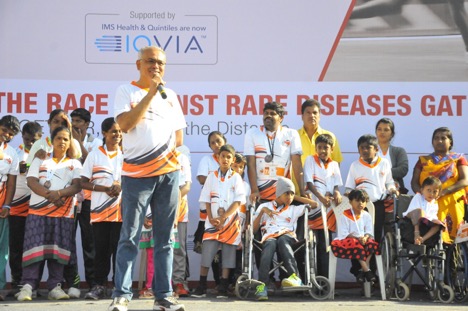
Vision for the Future
ORDI’s primary vision is for India to have a holistic rare diseases policy and for all treatable diseases in the world to get treatment. They are currently looking at a national policy for the treatment of rare diseases. Based on a court order, there was a national policy for the treatment of rare diseases, but it was suspended after year. Now, ORDI has filed public interest litigation in the Supreme Court. Owing its success to persistent efforts, a national policy on rare disease patients was drafted on the 13th of January, 2020. The collective movement initiated by ORDI with its perseverance has been successful in persuading the government, leading to many novel initiatives like “the definition for Orphan drug”, Inclusion of Rare Diseases in Rashtriya Aroghya Nidhi Scheme, Patient registry initiative by ICMR, etc. Prasanna’s 12 years of Rare Disease advocacy are just the beginning and long way to go to support 70 million estimated patients.



Great content! Super high-quality! Keep it up! 🙂